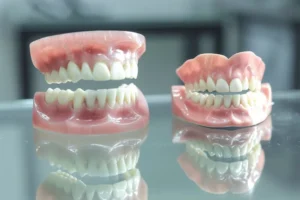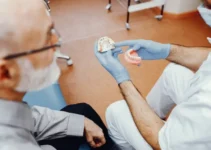Exploring removable denture solutions can provide an efficient way to restore functionality and aesthetics to your smile after tooth loss. These dentures are crafted to fit comfortably in the mouth, allowing for easy removal and maintenance. By opting for a removable denture, patients benefit from a non-invasive alternative that also supports facial structure and improves speech. This article delves into the types, benefits, and considerations associated with removable dentures, helping readers understand their options for achieving a complete and confident smile.
Types of Removable Dentures
Dentures, also known as false teeth, are prosthetic devices constructed to replace missing teeth. They are supported by the surrounding soft and hard tissues of the oral cavity. Dentures are classified into various types, each tailored to meet specific dental needs. Understanding the different types of removable dentures can help patients make informed decisions about their oral health.
The main types of removable dentures include complete dentures, partial dentures, and overdentures. Each type has its unique set of advantages and indications, depending on the number of teeth that need replacement, the structure of the patient’s mouth, and the patient’s lifestyle and preferences.
- Complete Dentures: Replace all teeth.
- Partial Dentures: Replace one or more teeth but not all teeth in an arch.
- Overdentures: Fit over a small number of remaining natural teeth or implants.
Complete Dentures
Complete dentures are designed for patients who have lost all of their teeth in one or both arches. These dentures rest directly on the gums and cover the entire arch. They are custom-made to fit the patient’s mouth and are removable for cleaning and maintenance. Complete dentures are typically made from acrylic and are designed to mimic the appearance of natural teeth and gums.
There are two main types of complete dentures: immediate dentures and conventional dentures. Immediate dentures are inserted immediately after the removal of natural teeth, while conventional dentures are made after the gums have healed. This healing period allows for a better fit and more comfortable wear.
Patients may initially experience some discomfort and difficulty with speech and eating when adjusting to complete dentures. Over time, most patients adapt well and can enjoy a functional and aesthetically pleasing solution to tooth loss.
Partial Dentures
Partial dentures are suitable for patients who have lost some teeth but still retain their natural teeth in one or both arches. These dentures consist of replacement teeth attached to a gum-colored plastic base, which is sometimes connected by a metal framework that holds the denture in place in the mouth.
Partial dentures not only fill in the gaps created by missing teeth but also prevent the remaining natural teeth from shifting. This helps maintain proper alignment and supports overall dental health. They are often a more affordable and less invasive option compared to other tooth replacement solutions like fixed bridges or dental implants.
There are two main types of partial dentures: removable partial dentures and fixed partial dentures. Removable partial dentures, as their name suggests, can be taken out and cleaned by the patient. Fixed partial dentures, also known as bridges, are cemented in place and are not removable by the patient.
Overdentures
Overdentures are designed to fit over a small number of natural teeth or dental implants. Natural teeth or implants provide additional support and stability for the denture. The remaining natural teeth are often reshaped and covered with metal crowns to allow the overdenture to fit securely over them.
Compared to complete dentures, overdentures offer several benefits. They provide better retention and stability because they are supported by natural teeth or implants. They also help preserve bone in the jaw, which can diminish over time when teeth are missing. This preservation of bone helps maintain facial structure and appearance.
Overdentures require that patients have a few remaining healthy teeth or are willing to undergo dental implant surgery. This makes them a versatile option for many patients struggling with tooth loss. With proper care, overdentures can offer a long-lasting and functional solution to restoring a full and healthy smile. For further reading on dental health and advanced treatment options, explore our other articles and stay informed about the latest advancements in dental care.
Benefits of Removable Dentures
Removable dentures are a popular choice for individuals who have experienced significant tooth loss. These prosthetic devices offer a variety of benefits, making them an attractive option for many patients. Below, we explore some of the most notable advantages of using removable dentures.
From restoring essential functions such as chewing and speaking to improving one’s appearance, removable dentures provide multifaceted benefits. Moreover, they are often a more accessible option compared to more permanent dental solutions like implants.
Understanding these benefits can help patients make more informed decisions about their oral health. Here, we delve into the restored functionality, improved aesthetics, and cost-effective nature of removable dentures.
Restored Functionality
One of the primary advantages of removable dentures is that they significantly restore functionality for individuals who have lost multiple teeth. Without teeth, tasks such as chewing and speaking can become incredibly challenging. Removable dentures mimic the natural teeth’s structure, allowing patients to enjoy a wider variety of foods and engage in conversations more confidently.
Studies have shown that dentures can help distribute bite forces evenly across the gums and remaining teeth, reducing the stress on specific areas. This helps to prevent bone loss and other complications that can arise from missing teeth. The ability to chew properly also aids in better digestion and overall health.
Moreover, with advancements in dental technology, modern removable dentures are more comfortable and secure than ever before. They are designed to fit snugly within the mouth, minimizing discomfort and slippage. This ensures that patients can eat, speak, and smile with greater ease and confidence.
Improved Aesthetics
Beyond restoring functionality, removable dentures play an essential role in improving aesthetics. Missing teeth can cause facial structures to sag, leading to an aged appearance. Dentures help to fill out the face, providing a more youthful and natural look. They are custom-made to match the color, shape, and size of the existing teeth, thereby ensuring a seamless blend with the patient’s natural smile.
Patients often report increased self-esteem and confidence after receiving dentures. No longer feeling self-conscious about missing teeth, they can smile and interact socially without hesitation. This psychological benefit is just as important as the physical improvements brought about by dentures. High-quality materials and advanced manufacturing techniques now allow for remarkably lifelike dentures. These dentures not only look good but also feel more natural, further contributing to a patient’s overall satisfaction.
Cost-Effective Solution
Another significant benefit of removable dentures is that they are a cost-effective solution for tooth replacement. Compared to dental implants, which require surgery and multiple appointments, dentures are generally more affordable and quicker to produce. This makes them accessible to a broader range of patients who may not have the time or resources for more intensive dental procedures.
Removable dentures also offer flexibility in terms of maintenance and adjustments. As the gums and jawbone change over time, dentures can be easily modified or replaced to maintain a good fit. This adaptability makes them a practical long-term option for individuals dealing with tooth loss.
Insurance plans are more likely to cover a significant portion of the cost of dentures, further reducing the financial burden on patients. This makes dentures not only a practical but also an economically viable choice for tooth replacement.
In conclusion, removable dentures provide a host of benefits that make them a suitable choice for many people. From restoring essential functions to offering aesthetic and financial advantages, they are a versatile solution for those dealing with tooth loss. For more insights into dental solutions, be sure to explore our other articles on advanced implantology and regenerative techniques.
Caring for Your Removable Denture
Proper care for your removable denture is essential for maintaining both the health of your mouth and the longevity of the denture itself. Neglecting appropriate maintenance can lead to oral health issues and potentially affect the fit and function of your denture. By following a comprehensive care routine, you can ensure that your denture remains in optimal condition.
Learning the best practices for cleaning, regular check-ups, and storage will make a significant difference. Ensuring that you’re consistent in these aspects of care will help avoid common problems such as plaque build-up, bad breath, and gum irritation. Let’s delve into the details of each aspect to give you a thorough understanding.
Daily Cleaning Routine
Engaging in a daily cleaning routine is crucial for the maintenance of your removable denture. Consistent cleaning helps in removing food particles, plaque, and stains that can accumulate over time. Begin by rinsing your denture under warm water to dislodge any loose debris. Avoid using hot water as it can distort the denture material.
Use a soft-bristle toothbrush and a non-abrasive denture cleaner to scrub all surfaces of the denture gently. Do not use regular toothpaste, which can be too abrasive. It’s equally important to brush your gums, tongue, and the roof of your mouth daily to remove plaque and stimulate circulation in your oral tissues.
Consider soaking your denture overnight in a denture-cleaning solution. This step not only helps in maintaining cleanliness but also in keeping the denture moist, preventing it from becoming brittle or warped. Always rinse the denture thoroughly before putting it back in your mouth to avoid ingesting any chemicals from the soaking solution.
Regular Dental Check-Ups
Scheduling regular dental check-ups is an integral part of denture care. Your dentist can assess the condition of your dentures and your oral health, identifying any issues like wear and tear or changes in the fit. Regular visits allow for timely adjustments and repairs, ensuring that your denture remains comfortable and functional.
During these check-ups, your dentist will also examine your oral tissues for any signs of irritation, gum disease, or other potential problems. Early detection of such issues can prevent more serious complications down the line. Make sure to schedule check-ups at least once a year, or more frequently if advised by your dentist.
Regular visits also offer an opportunity to discuss any challenges you’re facing with your denture, such as discomfort or difficulties in eating or speaking. Your dentist can provide solutions and tips for overcoming these issues, ensuring a better quality of life and denture experience.
Proper Storage
Proper storage of your removable denture when not in use is critical to its longevity. Always keep your denture in water or a denture-soaking solution to prevent it from drying out and losing its shape. Store your denture in a designated, clean container to minimize the risk of contamination and damage.
Avoid wrapping your denture in tissue or placing it in an unprotected location where it could be accidentally thrown away or damaged. If you need to remove your denture temporarily during the day, make sure to rinse it and store it safely.
If your denture has any metal clasps, be sure to follow your dentist’s recommendations on the best storage practices, as metal components might have specific care requirements. Keeping the denture moist and in a clean, safe environment will help maintain its structural integrity and appearance.
By integrating these key aspects of denture care into your routine, you can enjoy a comfortable and effective denture experience. For more in-depth information on related topics, explore our other articles.
Common Questions About Removable Dentures
If you’re considering removable dentures as a solution for tooth replacement, you likely have some questions about their use, comfort, and maintenance. Here are some answers to common inquiries.
What are the benefits of choosing removable dentures?
Removable dentures offer several advantages, including improved chewing ability, enhanced speech, and restored facial aesthetics which may have been affected by tooth loss. They are also generally less expensive than permanent options like implants and can be fitted more quickly.
How should I care for my removable dentures?
Caring for removable dentures is crucial to maintaining oral health. Dentures should be removed and cleaned daily with a denture cleaner, not regular toothpaste which can be abrasive. They should also be soaked overnight in a denture soaking solution to keep them moist and maintain their shape. Additionally, you should continue to brush your gums, tongue, and palate every morning before inserting the dentures to stimulate circulation in the tissues and help remove plaque.

My name is Salman Kapa, a 73-year-old expert in bone regeneration and dental implantology. With decades of experience in the field, I am dedicated to advancing our understanding of oral health and hygiene. Through my research and writing, I aim to contribute to the development of innovative solutions in dental care.




